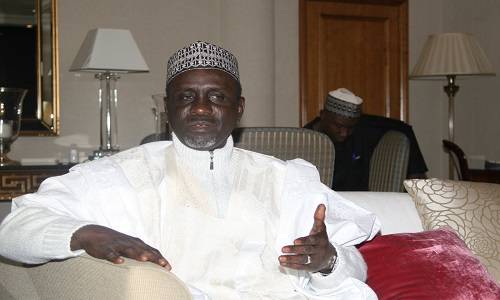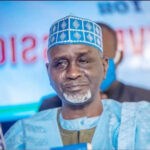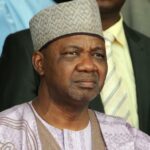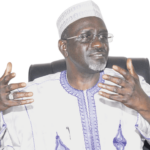Malam Ibrahim Shekarau’s slow-motion defection from PDP to APC, apparently done with reluctance and characterized by twists and turns, capped the season of defections and has sent shock waves down the spine of Nigerian politics. Shekarau is one of the most gentle, most humble and most considerate men in Nigerian politics. His recent move proved that defection in Nigeria is not for the rambunctious alone.
Shekarau’s defection was triggered by the earlier defection of Rabi’u Musa Kwankwaso from APC to PDP. In particular, Shekarau defected because PDP national leadership dissolved the Kano State Exco and reconstituted it in Kwankwaso’s favour. It was the second time in four years that Kwankwaso displaced Shekarau, and for the same reason. In 2014, APC’s national leaders handed the Kano State chapter to Kwankwaso, prompting Shekarau’s defection to PDP. His recent move has brought him into alliance with Abdullahi Umar Ganduje, an apt combination since both men are mild mannered and share a common adversary, the combustible Kwankwaso.
Rural folks in Nigeria who have lived in the same house as their grandparents, have been married to the same wives for decades and maintained the same friends throughout their lives tend to have a dim view of defection. But who is there in politics these days to counsel defectors? While the Kano Big Three juggled around with defections, their neighbours stood askance, lacking the moral authority to counsel them. Their neighbour to the west, Aminu Bello Masari, was a PDP House of Representatives Speaker who defected to CPC in 2010 and ended up in APC in 2013. Their neighbour to the south, Nasiru el-Rufa’i, was a PDP FCT Minister but defected to CPC in 2010 and also ended up in APC. If the Kano titans look further west to Sokoto, Aminu Waziri Tambuwal cannot advise them, having himself started out as an aide to a PDP senator, defected to ANPP in 2003, returned to PDP in 2007, under which he served as House Speaker; left for APC in 2014 and returned to PDP a month ago.
Tambuwal’s political associates said he defected because Aliyu Magatakarda Wamakko gave him no breathing space in the Sokoto APC. Wamakko too was a two-time defector. He left ANPP for PDP in 2007 and defected to APC in 2013, in both cases for national political reasons, not local ones. The Sokoto men’s southern neighbour, Abubakar Atiku Bagudu of Kebbi, cannot counsel defectors either. A PDP senator for seven years, he defected to APC a day before its governorship primary in 2014. His predecessor Mohammed Adamu Aleiro was an ANPP governor, a PDP FCT Minister and an APC senator. Bagudu’s southern neighbour, Abubakar Sani Bello of Niger, is also unable to offer counsel. He was a commissioner under PDP before he left for APC.
Tambuwal’s return to PDP both simplified and complicated matters for Attahiru Dalhatu Bafarawa, who defected to PDP in 2014 when APC’s national leaders also gave him the Shekarau treatment. Bafarawa apparently took Tambuwal’s coming into Sokoto PDP in his stride. He already holds an enviable record in defection. A two-term ANPP governor, Bafarawa set up his own party, DPP in 2006, defected to ACN three years later, went with it to APC in 2013 and defected to PDP a year later.
Serving and former governors all around can hardly counsel against defection. Samuel Ortom of Benue, who left PDP for APC in 2014, recently returned to PDP. His northern neighbour Umaru Tanko Al-Makura was a PDP chieftain who defected to CPC in 2010 and arrived through it into APC. Al-Makura’s predecessor Abdullahi Adamu served two terms as PDP governor and senator before defecting to APC in 2013. The Nasarawa men’s northern neighbour, Simon Bako Lalong of Plateau, was the PDP state assembly speaker before he defected to APC in 2014. The gentle Isa Yuguda of Bauchi was a PDP Minister who defected to ANPP in 2007, became the governor, returned to PDP and recently defected to Green Party. Muhammadu Danjuma Goje of Gombe could have counselled against defection but this former PDP minister, governor and senator defected to APC in 2013.
Ideally, the Senate President should provide a moral compass against defection but Abubakar Bukola Saraki can hardly do so. Though his illustrious father was an APP chieftain in 1999, Bukola started out in politics as senior special assistant to a PDP president. He served two terms as PDP governor and one term as PDP senator before he defected to APC in 2013 and recently returned to PDP. Rotimi Amaechi, director general of President Buhari’s re-election campaign, cannot counsel defectors either because he defected from PDP to APC in 2013. Former vice president Atiku Abubakar, who looms large on the political scene, cannot moralise against defection. In 2006 he defected from PDP to AC, quietly returned to PDP a year later, defected to APC in 2014, saying it was his last bus stop and he returned to PDP earlier this year, vowing never to leave it again.
Nor can Ali Modu Sheriff counsel against defection. This two-term ANPP governor of Borno was always accused of fraternizing with PDP federal government. Having joined APC in 2013, he left a year later for PDP, became its national chairman, caused immense intra-party havoc before he returned to APC last year. Orji Uzor Kalu, too, cannot moralise against defection. This two-term PDP governor set up his own party [PPA] in 2007, which won the governorships of Abia and Imo. When both proteges returned to PDP, Kalu followed suit and two years ago he defected to APC. Kalu’s neighbour Rochas Okorocha has no mouth to talk, figuratively speaking. The man who came second in PDP’s presidential primary in 2007 later defected to APGA, on whose platform he became Governor of Imo State and went to on join APC in 2013. Admiral Murtala Nyako cannot talk either; having won four governorship elections on PDP’s platform between 2007 and 2012, he is now described as an APC chieftain. Self-appointed national moral compass Olusegun Obasanjo cannot speak either because he defected from PDP to APC, then to Coalition for Nigeria and on to ADC.
Through PDP’s imperious 16-year rule and through its traumatic 2015 election defeat, some leading politicians never left it. One of them is Ahmed Mohammed Makarfi, the mild-mannered former governor of Kaduna, former senator and current presidential aspirant. Another one is Sule Lamido, who served as Foreign Minister and two-term governor under PDP’s umbrella. Chief Bode George, a very prominent PDP chieftain in the early years, has never left the party. If the stream of visits by PDP presidential aspirants to his Minna residence is any indicator, General Ibrahim Babangida too has remained in PDP through thick and thin, as has his close associate, General Aliyu Mohamed Gusau.
On the other hand, there are a few prominent politicians who never belonged to PDP, a very important statement in Nigerian politics. The leader in that regard is Muhammadu Buhari, who started out as an ANPP member in 2002, defected to CPC in 2010 and arrived through it to APC three years later. Asiwaju Bola Tinubu, too, has never been in PDP. He became governor of Lagos under AD in 1999. After his party’s 2003 election debacle, Tinubu transformed it into AC in 2006, renamed it to ACN a year later and arrived in APC through it in 2013. Adams Oshiomhole too entered politics as an ACN member in 2007 and arrived in APC through merger.
Of serving state governors, Kashim Shettima of Borno has never been in PDP. He became a commissioner in 2007 and governor in 2011, both under ANPP, and arrived through it to APC. Shettima’s western neighbour, Ibrahim Gaidam, trod a similar path, first becoming an ANPP deputy governor in 2007 and arriving into APC through the merger of 2013. Shettima and Gaidam’s path was equally trod by Ahmed Sani Yariman Bakura, a two-term ANPP governor and senator who arrived in APC through merger. Abdulaziz Yari Abubakar, former House of Representatives member and current governor of Zamfara, trod a similar path. So, let the politician who never defected cast the first stone at Malam Ibrahim Shekarau’s defection.

 Join Daily Trust WhatsApp Community For Quick Access To News and Happenings Around You.
Join Daily Trust WhatsApp Community For Quick Access To News and Happenings Around You.


